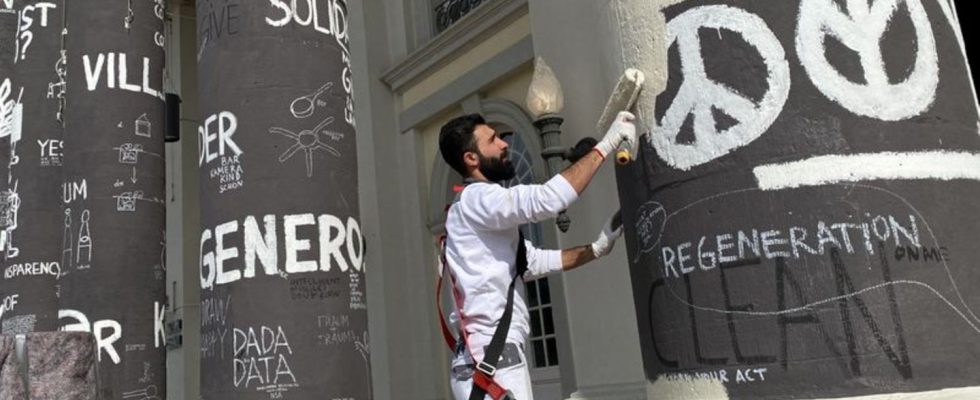Art show
“Heap of shards”: again trouble about the documenta
The day after the end of documenta fifteen, the columns of the Fridericianum in Kassel will be painted over. photo
© Uwe Zucchi/dpa
Six art experts should choose who will lead the next documenta in 2027. But the committee dissolved even before the candidates were chosen. The spiral of excitement in the cultural sector continues to turn.
“The fundamental problem is that the culture of debate has completely slipped out of our hands,” says Nicole Deitelhoff. The scientist was at the head of the committee that was supposed to deal with the anti-Semitism scandal after documenta fifteen. After the Hamas attacks on Israel on October 7th, the discourse situation came to a head again. “Now you can no longer talk to each other at all. Every word is put on the scales and leads to you being put in a corner at a breathtaking speed.”
The corners: On the one hand, these are the pro-Israel voices that are sensitive to anti-Semitic tones and everything that questions Israel’s right to exist, such as the BDS boycott movement. On the other side are the pro-Palestinian voices, which, according to Deitelhoff, are overrepresented in the cultural sector. A series of debates are currently igniting along these lines of conflict, most recently at the Frankfurt Book Fair, where the award ceremony for a Palestinian author was postponed and a pro-Israel opening speech caused turmoil in the hall.
What happened?
The search committee that was tasked with selecting a new artistic director for the next documenta in 2027 also felt this climate. First one participant dropped out, then a second, and on Thursday the remaining four also gave up. The reason they cited was “the polarized debates” that put their work under increasing pressure.
The date of the next documenta is no longer available. Traditionally it takes place every five years. “The question of when is not the top priority in the current situation,” said managing director Andreas Hoffmann. “It’s about leading the documenta into a good future.”
Politicians spoke on Friday of a “heap of shambles”, and Deitelhoff finds the situation at the documenta “devastating”. It will probably be difficult to find new candidates for the search committee. This makes it all the more difficult to find curators who have the confidence to undertake such a mammoth project in this climate. Especially if you carry around the legacy of documenta fifteen, which was about to be canceled because of anti-Semitic works of art.
What’s next in Kassel?
“We now need a credible new start,” demanded Minister of State for Culture Claudia Roth (Greens). The federal government is ready to work on the realignment. Roth said she very much welcomes “the fact that documenta GmbH is first dealing with its own fundamental redefinition and structural reform before planning for the 2027 edition begins.” The federal government is ready to work on a realignment.
The documenta shareholders – the state of Hesse and the city of Kassel – say they want to rebuild the trust that has been lost. The first step is to restart the documenta’s “operating system,” says managing director Hoffmann. The organizational structure is currently being examined. With the help of external experts, we look at responsibilities, structures and processes. Only when this realignment process has been completed can one take the next step and begin the discovery process again.
And how do we get out of the debate loop?
“The current conflict over the documenta cannot be seen in isolation from the situation in the international art world,” analyzes the head of the Anne Frank educational institution, Meron Mendel. “The debates about anti-Semitism, Israel and the Middle East conflict are dividing the scene.” Artists in Germany are faced with a dilemma. “They are partly dependent on the international art market and therefore do not dare to take a differentiated position.”
For Mendel, however, bans cannot be the solution. “Rather, a consensus must be created with the management of the cultural centers that opposes any forms of exclusion.” Decision-makers such as curators, museum management or members of search committees must be “equally open to all artists, regardless of their origin or national affiliation.”
“We need art more than ever,” says Minister Roth. “We need protected spaces for art, we need its debates and impulses for an open society.” documenta managing director Hoffmann also emphasizes that debates are “part of the documenta’s DNA”. Deitelhoff finds it problematic when the impression is created that artistic freedom is threatened. “The answer cannot be that we allow a little anti-Semitism.”

